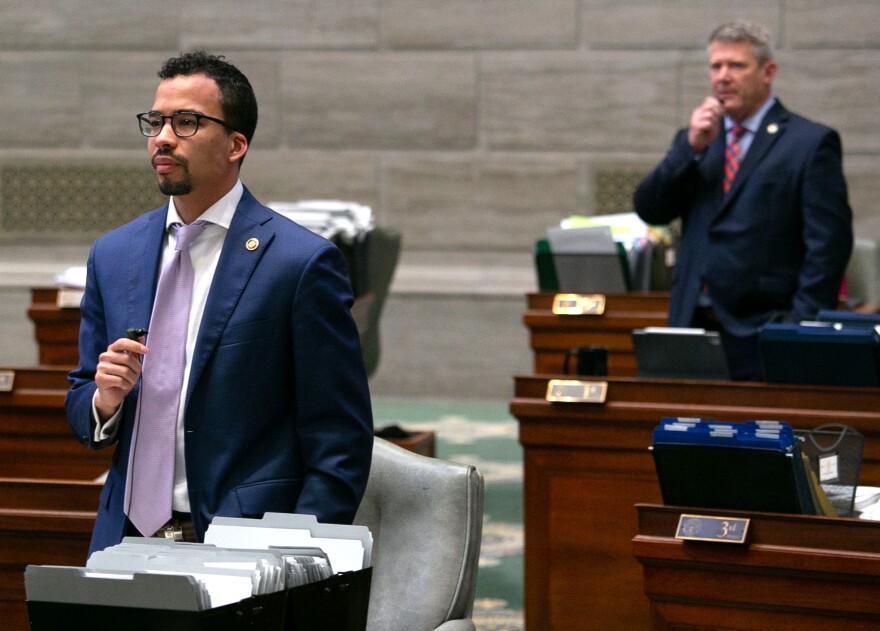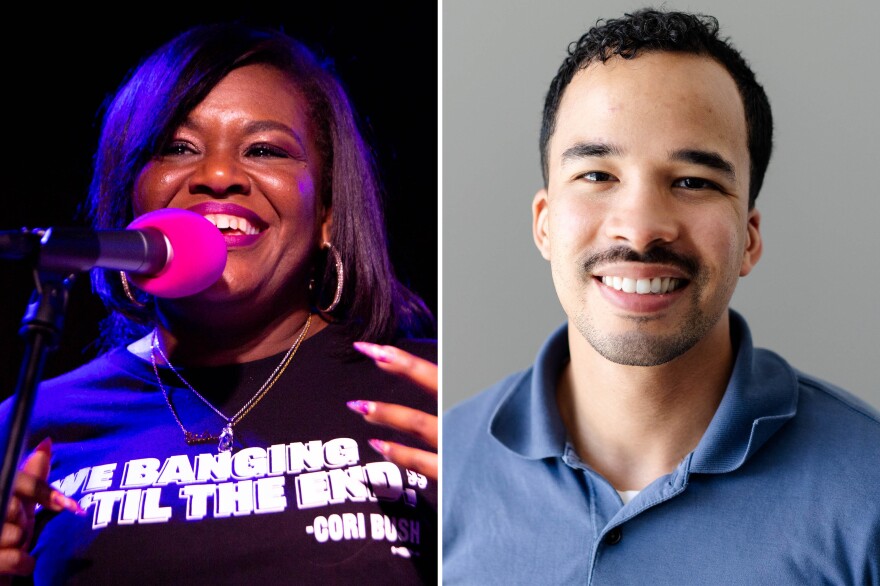On a recent Friday evening on St. Louis’ Cherokee Street, Congresswoman Cori Bush is celebrating her birthday along with some of her close legislative friends and diehard supporters.
Flanked by Congresswomen Illhan Omar of Minnesota and Ayanna Pressley of Massachusetts, Bush eventually grabbed the microphone and stirred the crowd when she said:
“They said it was a fluke. Was it a fluke?”
“No!” yelled the crowd.
Aug. 2 will be the ultimate test of whether the 1st Congressional District plans to keep Bush in office for the long haul or replace her with state Sen. Steve Roberts. The contentious Democratic primary includes Roberts challenging Bush’s record and Bush's campaign and her supporters focusing attention on sexual assault allegations against Roberts.
If Bush can continue to improve her performance with Black voters, she’ll almost certainly have enough backing from white residents to win handily. But if Roberts can capture most of the African American vote in a district that has a plurality of Black residents, he could make Bush a one-term congresswoman.

From Ferguson to Washington
Bush won a landmark victory in 2020 when she unseated Rep. Lacy Clay. It ushered in a new era of St. Louis politics, since either Clay or his father, Bill Clay, had represented the 1st District since the late 1960s.
“And what I said was that I would be the same person, I would bring the same energy that I had out on the streets of Ferguson,” Bush said. “The same energy that people saw protesting and all of the advocacy for so many years — I would bring that same energy to Congress. And that I have done.”
What Bush is referring to is how she came to prominence in 2014 as a demonstrator protesting Michael Brown’s death. She had a trial by fire almost immediately, when the Jan. 6 insurrection occurred three days after she was sworn in in 2021. Bush filed a resolution to expel members who aided in the insurrection, though that measure was not voted on.
Bush also championed numerous environmental proposals, such as mapping out where President Joe Biden should direct funds. She’s also made national news for her advocacy for abortion rights and sleeping on the steps of the U.S. Capitol to extend an eviction moratorium.
“You've been able to see the activist also on the ground even at the U.S. Capitol,” Bush said. “We decided that when 11 million people were at risk for evictions, we decided to stay out there on the steps of the Capitol to highlight the situation and see if we could get an extension to the eviction moratorium. We were able to win that.”
In addition to her policy proposals, Bush is touting money that came to St. Louis and St. Louis County — particularly through the American Rescue Plan Act. She’s working closely with St. Louis Mayor Tishaura Jones to make sure that the city’s share of the funds go to help historically disadvantaged places, like north St. Louis.
“That’s money coming directly to this community,” Bush said.

Roberts questions Bush’s stances
Criticizing some of Bush’s policy stances are part of the core messaging of Roberts’ campaign.
He chastised her votes against a federal infrastructure bill and some sanctions against Russia in retaliation against its invasion of Ukraine. Roberts also disagrees with Bush’s criticism of Israel.
“You know, when I was first elected to the Senate, my focus was to serve my full two terms,” Roberts said on an episode of the Politically Speaking podcast. “But I’ve noticed a continuing pattern of troubling votes. And me and other elected leaders felt that our voices weren't being heard.”
Roberts first won election to the Missouri House in 2016 and won a competitive Democratic primary for the Missouri Senate in 2020. His congressional campaign has focused on what he’s been able to accomplish in the Democratic superminority — as well as promising to be a “normal Democrat” who supports President Joe Biden’s agenda.
He backs America continuing to support Ukraine’s fight against Russia, as well as gun control measures. Roberts also supports a freeze on the federal gas tax to ward off inflation at the pump. He also would have voted for the infrastructure legislation.
“You can’t be in a position where if you don’t get everything you want, you’re a no vote,” Roberts said. “We need elected leaders who are willing to work with folks on both sides of the aisle with a priority of bringing resources back to St. Louis City and St. Louis County.”
When asked how he would more effectively articulate support for abortion rights than Bush, who has made that issue a central part of her reelection campaign, Roberts said that the congresswoman should have been channeling her energies into legislating instead of activism.
“I’ll say Cori does a fantastic job as an activist bringing attention to issues that we’re both passionate about. I remember when she was camping out on the steps of the Capitol,” Roberts said. “The work of a legislator is done in the Capitol building, not out in the streets. That’s what I’ll be doing.”

Contentious contest
For her part, Bush dismissed Roberts’ criticism of her votes, saying that if she voted with Democrats all the time there wouldn’t be any leverage to change critical pieces of legislation.
She said if she just skimmed over parts of legislation, she wouldn’t be doing her job effectively. “That's not why St. Louis sent me to Congress,” she said.
Bush has also pushed back against the idea that she’s focused her time in Congress only on protesting instead of legislating. Earlier this month, Bush and Minnesota Sen. Tina Smith filed legislation aimed at protecting access to medication abortion.
Roberts has had to fend off attacks on several fronts. From the moment he announced for Congress, his detractors pointed to two sexual assault allegations against him. The first was from the late former legislator Cora Faith Walker, the other was from attorney Amy Harms. Roberts wasn’t charged in either case.
Shortly after Walker died, Roberts went on local television news stations to disclose the details of a non-monetary settlement with the former state representative. It included language in which Roberts admitted to no wrongdoing. Harms ended up receiving a $100,000 financial settlement. Roberts said he wanted to fight the case but was overruled by his insurance company.
“I recognize that it's unfortunate, but it's something that's going to follow me for the rest of my life,” Roberts said. "But I'm not going to let it hold me back — and I'm going to keep moving forward."
In response to Roberts' comments, Harms said: "“Ultimately, if this is something that he wanted to pursue, it was something that he could have pursued. He chose not to.”
A redesigned district
One of the lesser-talked about story lines of the 1st District contest is how redistricting changes could hypothetically hurt Bush’s chances.
Roberts supported a congressional map that moved portions of Richmond Heights and Maplewood into the 2nd District. These areas overwhelmingly voted for Bush in 2020. Roberts and other Black officials contend that they supported this map to maximize the minority population in the 1st District.
“That is a historic Black congressional district since the time of Bill Clay and followed on by his son Lacy,” said state Rep. Joe Adams, D-University City. “And I would like for that district to stay African American if possible.”
Bush didn’t win the majority of the Black vote in 2020 in her bid against Clay. But if she manages to improve her performance in north St. Louis and north St. Louis County, it could send a strong message to other Democrats who want to challenge her.
“If she gets substantial black votes, she wins going away,” said Mike Jones, a former St. Louis alderman and observer of regional politics. “And I would argue that that would be an inoculation against a serious political challenge in the future. It’s just like being doubled boosted against COVID. It doesn’t mean you can’t get it. But you will probably be OK.”
Roberts is touting endorsements from a slew of Black political officials, including Lacy Clay; state Rep. Marlon Anderson, D-St. Louis; and St. Louis Sheriff Vernon Betts. He also said that the fact he’s won in predominantly Black House and Senate districts helps his cause.
“We’ve got a great set of endorsements and support of folks from those areas,” Roberts said. “And these areas, especially north St. Louis, I’ve done very well in.”
Bush, meanwhile, is getting support from the Congressional Black Caucus political action committee. She’s also getting endorsements from high-profile progressive political figures, including Sens. Bernie Sanders and Elizabeth Warren. Bush was a prominent Sanders supporter in 2016 and 2020.
Whoever wins the Democratic primary is likely to win in November since the district is overwhelmingly Democratic.
Follow Jason on Twitter: @jrosenbaum










